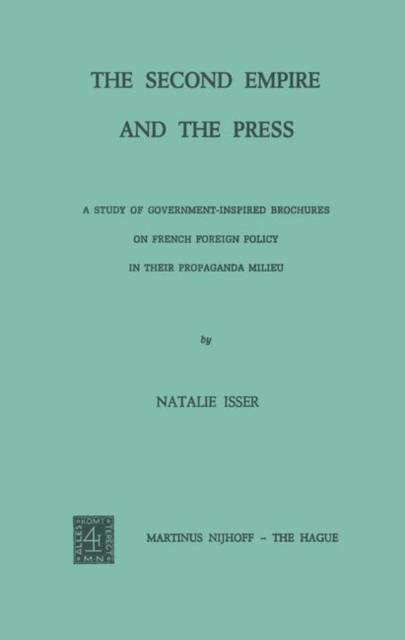
Bedankt voor het vertrouwen het afgelopen jaar! Om jou te bedanken bieden we GRATIS verzending (in België) aan op alles gedurende de hele maand januari.
- Afhalen na 1 uur in een winkel met voorraad
- In januari gratis thuislevering in België
- Ruim aanbod met 7 miljoen producten
Bedankt voor het vertrouwen het afgelopen jaar! Om jou te bedanken bieden we GRATIS verzending (in België) aan op alles gedurende de hele maand januari.
- Afhalen na 1 uur in een winkel met voorraad
- In januari gratis thuislevering in België
- Ruim aanbod met 7 miljoen producten
Zoeken
The Second Empire and the Press
A Study of Government-Inspired Brochures on French Foreign Policy in Their Propaganda Milieu
Natalie Isser
Paperback | Engels
€ 83,95
+ 167 punten
Omschrijving
Public opinion had roots in the nineteenth century with the develop- ment of industrialization. What is this public? It is the mass of individuals who comprise a society or a nation; this mass in turn is divided into many groups, which have their own interests, prejudices, and beliefs. A govern- ment, whether democratic or not, is well aware of the power of public opinion and is anxious to measure and shape it. All three branches of government may direct and educate public thinking, using the instru- ments of propaganda. Propaganda is any idea and action designed to influence the views and actions of others. Today's means of propaganda are books, newspapers, radio, movies, television, public schools, and lastly the rostrum. Molders of opinion believe that words, sounds, and pictures accomplish little unless they are carefully organized and inte- grated into a well-conceived plan. Once this is accomplished, the ideas 1 conveyed by the words will become part of the people themselves. Special techniques, such as the employment of fear and the play on prejudices, have been used quite succesfully by modern states to impose their own dogmas and policies. Because the social scientist has been aware of the study of public opinion, he may have concluded that it was a modern innovation; but governments have always been concerned with public opinion, though not always understanding it, and have attempted to influence it.
Specificaties
Betrokkenen
- Auteur(s):
- Uitgeverij:
Inhoud
- Aantal bladzijden:
- 231
- Taal:
- Engels
Eigenschappen
- Productcode (EAN):
- 9789401504140
- Verschijningsdatum:
- 1/01/1974
- Uitvoering:
- Paperback
- Formaat:
- Trade paperback (VS)
- Afmetingen:
- 156 mm x 234 mm
- Gewicht:
- 349 g

Alleen bij Standaard Boekhandel
+ 167 punten op je klantenkaart van Standaard Boekhandel
Beoordelingen
We publiceren alleen reviews die voldoen aan de voorwaarden voor reviews. Bekijk onze voorwaarden voor reviews.









